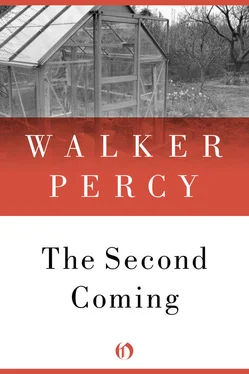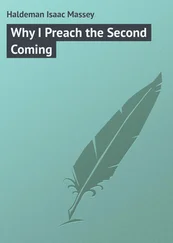“You got yourself a deal.”
When he moved his thigh and picked up the Luger between his legs, the metal felt hotter than his own body.
The glass doors of St. Mark’s closed behind the chaplain. Closing the door for the last time. That was it. That’s why everything looked so clear. He knew he would not come here again. When you leave a house for the last time and take one last look around before closing the door, it is as if you were seeing the house again for the first time. What happened to the five thousand times between?
2
He had not known who the girl in the greenhouse was until Kitty told him twice, once before the girl ran away from the sanatorium and again afterwards. But even when he found out and at the same time saw that Kitty did not know where her daughter was, he could not bring himself to pay close attention. Something else engaged him even as Kitty and her grinning dentist husband and grinning Jimmy Rogers pressed in upon him. They wanted something from him. It was clear but not from what they said. They were telling jokes and saying something about property, Arabs, money, state laws about guardianship and inheritance, developing an island. An island? Though he was not listening closely, there was the unmistakable feeling in the back of the neck when someone wants something and is casting about for a way to ask. Not finding a way, they move closer, heads weaving like a boxer’s, looking for an opening.
What did they want? Money? Free legal advice? Both? It seemed to be Kitty who wanted it most. At least she came closest, touched, hugged, kissed, poked, jostled, swayed against, jangled, shimmered.
What did she want?
Though he faced the husband, now not three feet away, it was hard to take in more than the grin, white teeth, styled hair, pink clothes.
Instead he gazed past them, past the white wicker and stuffed linen furniture, the lacquered ivory-colored tables, blue porcelain lamps — it was Marion’s Chinese Export blue-and-white room, what in the South used to be called a sun parlor — to Leslie and the Cupps and Jack Curl, past Lewis Peckham the golf pro listening politely to Bertie, Bertie making grips on an invisible golf club; past the others, guests and waiters, past the huge Louis XV secretary with its doors open to show the decoupage panels, to the bank of windows broad as a ship’s bridge opening onto a short steep yard dropping off to the gorge and the valley beyond.
A gazebo perched on the lip of the gorge.
A twist of cloud, thick as cotton, rose from the gorge behind the gazebo and a small scarlet oak he had never noticed before. It was stunted and lopsided and black. The few leaves that hadn’t fallen hung straight down as if they had been tied on by a child. The white gazebo was almost whited out by the cloud.
From beyond the post oak in the silent swamp came the geclick of the Greener breech being broken and presently the gecluck of its closing.
That was when you reloaded.
But you had only shot once, at the first single. You had another shell. Why not wait until the second shot at the second single to reload?
Because you knew you only needed three shots, two for the quail and one for you.
Wait a minute. There were four empty Winchester Super-X shells afterwards, three on the quilt beside him in the Negro cabin where he was lying after the woman wiped the blood from his face, and a fourth in the Greener the guide had brought back with the shells. The cabin smelled of kerosene and flour paste. Newspapers were freshly pasted on the walls.
But there were only three shots.
Wait a minute. Is it possible to fire both barrels of the Greener at once? There were two triggers.
“Wait a minute,” he said aloud. Then he smiled and shrugged. What difference did it make?
The three Arabs were pressing in upon him. That’s what they looked like, Arabs: the dentist, Jimmy Rogers, and Bertie: brown-skinned, coming too close, smiling, nodding — Jimmy Rogers was even rubbing his hands together.
“Excuse me,” he said. “I have to go upstairs and tend to some business.”
“What business?” asked Kitty, frowning.
Her closeness and nosiness gave him a shower of goose-bumps, a peculiar but not unpleasant sensation.
“I’m looking for an old shotgun.” He noticed absently that it had become possible to tell the truth, that it was no longer necessary to make an excuse, go fix a drink.
“What are you going to do, shoot us?” asked Kitty with a mock falling away. She told the others: “He was always like that, ready to have a shoot-out if somebody crossed him, right here and now.”
No, I wasn’t always like that.
“That was the way it was where we came from, wasn’t it, Will?”
“I was going to look for an old shotgun that belonged to my father and grandfather.”
“You didn’t mess with them either,” Kitty told the others. “Where we came from, if you fell out with somebody, you didn’t smile at them and go around behind their backs. You called them out and had it out with them.”
That’s right. We call ourselves out and have it out with ourselves. Famous one-man shoot-outs.
“I keep a shotgun loaded with double-ought buckshot under my bed,” said the grinning dentist-husband. “I fixed a rack just inside the rail. All I got to do is reach down with one hand. Just let some sapsucker come in the door or window. Just let him come. I know a man, a substantial man no redneck, who just the other day bought a shotgun and a.357 Magnum and two cases of shells, and he’s a college graduate, not one of your nuts.”
The grin, he noticed, went back to the eyeteeth. What’s this guy so angry about? His wife? Being a dentist? His daughter? No wonder his daughter’s nuts. Who does he want to shoot? Probably niggers.
“Speaking of the Wild West, guns, and shoot-outs,” said Jimmy Rogers, coming even closer, close as a lover, and, putting his head down in their midst, told them one of his jokes.
Though he tried to listen to the joke, his mind wandered. Jimmy pulled him close and then gave him a final little tug. The joke must be over. “I have to go,” he said.
“Hold on, son,” said Kitty, but it was she who held on, laughing and grabbing his arm with both hands, wrists all aglint and ajangle with gold. There was about her a rushing way he didn’t remember of coming close and pushing ahead of her the smell of her hair and a perfume — Shalimar? How did he remember after all these years? It smelled like Shalimar sounded — and a friendly kind of jostling, jostling him with arm, shoulder, elbow, hip, hair swinging past the hollow of his throat. What he did remember, not he but his body, was the warmth in the places where she touched him. It was curious. Spots she touched grew warm as if he had had a positive skin test. His antibodies remembered her body. “Hold it, son. I need to have a word with you.” Curious! Something was both strange and familiar. Suddenly he realized he had not thought about women for a long time, not since Marion’s death, not since long before Marion’s death — except for the time he thought about Ethel Rosenblum and fell down in a bunker. For three years he had lived in a dream of golf and good works.
“What?” he said, turning an ear down to her upraised face. She wanted to whisper something. The Arabs fell back, stopped smiling, bent forward in a huddle, made plans.
“Look, Will. The summerhouse is lost in the cloud.”
“Yes, it is.”
“Do you realize what happened to us?”
“No, what?”
“We passed each other like ships in a fog. I was a fool. I should have grabbed you when I could.”
“As it has turned out, I don’t think—”
“Let’s go get lost in the fog,” she whispered. She couldn’t quite whisper but like a child trying to whisper sputtered in his ear. His hair raised. He nodded.
Читать дальше












